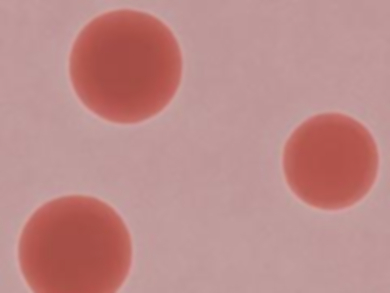PEDOT (poly(3,4-ethylenedioxythiophene)) is a conducting polymer typically used in film form for solar cells. Nicole H. Levi-Polyachenko, Wake Forest University, Winston Salem, NC, USA, and colleagues found a new use for PEDOT in nanoparticle form, namely biomedical studies.
PEDOT nanoparticles (pictured) were synthesized in aqueous solution by first generating a micellar template using surfactant. A variety of morphologies were formed by varying mechanical influences, such as sonication and stirring, or controlling the ratio of surfactant, oxidant, and monomer in the reaction. The researchers then studied biomedical applications by culturing cells in the presence of PEDOT nanoparticles.
The nanoparticles assisted in orienting collagen fibers during gelation, as well as increased the electronic and ionic conductivity in the matrix where cells are grown. Additionally, the nanoparticles increased the viability of cultured human cells, possibly through enhancing cell-to-cell communication during proliferation.
When exposed to infrared light, the nanoparticles increased the temperature of cells in the collagen gel by up to 7 °C above basal temperature, to the range of mild hyperthermia. Generating such artificial hyperthermia allows biomedical researchers to examine the effects of hyperthermia on cells more closely. When exposed to extreme infrared light, temperatures are raised further to ablate diseased cells, giving the nanoparticles clinical applications.
- Shaping PEDOT nanoparticles for use in 3D tissue phantoms,
Elizabeth M. Wailes, Christopher M. MacNeill, Eleanor McCabe, Nicole H. Levi-Polyachenko,
J. Appl. Polym. Sci. 2016.
DOI: 10.1002/app.43378




